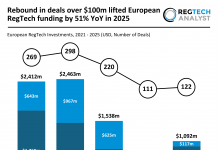AI is transforming the complex and ever-evolving world of compliance management. According to 4CRisk.ai COO and co-founder Supradeep Appikonda, studies from PwC and IBM reveal how regulatory obligations have become more intricate, burdensome, and expensive.
Appikonda, who has decades of experience implementing enterprise software for large organisations, explained that AI-powered compliance mapping can reduce manual efforts by as much as 90%, helping teams strengthen oversight and minimise risk.
Regulatory mapping is a cornerstone of effective compliance and risk management. It involves aligning external regulations—both global and local—with an organisation’s internal policies, procedures, and controls. By clearly identifying how each rule links to internal processes, companies can confirm that their obligations are met while exposing any gaps that could lead to fines or reputational harm. When powered by AI, this mapping process delivers insights in real time, allowing leaders to demonstrate compliance to regulators and stakeholders with confidence.
Recent research paints a stark picture of how compliance has grown in complexity and cost. PwC’s 2025 Global Compliance Study found that 85% of companies say compliance has become more complex in the past three years. The U.S. Securities and Exchange Commission imposed $8.2bn in financial remedies during FY2024, including $600m in penalties for recordkeeping failures. Meanwhile, GDPR fines in the EU reached roughly €5.65bn by early 2025, with major penalties issued to firms such as Uber and Meta.
Cybersecurity and AI-related breaches are adding to the strain. Verizon’s 2024 report attributed 74% of breaches to human error, while IBM found the average breach cost has risen to $4.4m. Even more concerning, 97% of organisations experienced at least one AI-related security incident last year, often due to weak access controls. Drata’s research also highlights operational fatigue, with 76% of firms calling manual, point-in-time compliance processes a major burden.
AI-powered compliance mapping offers a compelling solution. By automating the linking of regulatory obligations to policies and controls, compliance teams can identify redundancies, close gaps, and simplify frameworks in minutes rather than weeks, Appikonda stated. The technology not only eliminates human error but also enhances decision-making by showing how each control supports regulatory requirements. As Appikonda explained, this data-driven visibility empowers teams to allocate resources efficiently and make better strategic decisions.
4CRisk.ai’s suite of AI-driven tools brings this vision to life. Its products include Regulatory Research, Horizon Scan, Compliance Maps, Regulatory Change Management, and Ask ARIA Co-Pilot. These solutions use domain-specific AI models to process information up to 50 times faster than traditional methods. Horizon Scan monitors over 2,500 regulatory sites for new developments, while Regulatory Change Management helps organisations assess and respond to new rules. Ask ARIA Co-Pilot, meanwhile, serves as an always-on virtual advisor, answering complex compliance queries and saving up to 90% of staff time.
For more insights, read the full story here.
Read the daily FinTech news
Copyright © 2025 FinTech Global
Copyright © 2018 RegTech Analyst






